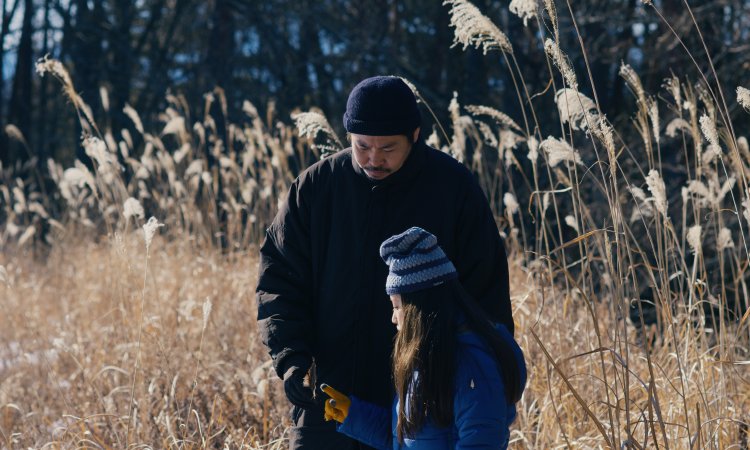Evil Does Not Exist

In a snowy, forested Japanese village Takumi (Hitoshi Omika) spends his days splitting wood, collecting wild wasabi and water from a mountain stream for Sachi (Hazuki Kikuchi, “Happy Hour”) and Kazuo’s (Hiroyuki Miura) udon noodle restaurant and teaching his young daughter Hana (Ryo Nishikawa) about the local fauna and flora. He’ll also become a community leader and consultant when Takahashi (Ryuji Kosaka) and Mayuzumi (Ayaka Shibutani, "Happy Hour") announce a last minute presentation about the Glamping site their talent agency hopes to build there in “Evil Does Not Exist.”
Laura's Review: B
When his “Drive My Car” composer Eiko Ishibashi asked him to create images to accompany a live performance of hers, Ryûsuke Hamaguchi went to the area where she lived for inspiration and her project, ‘Gift,’ also become this, his latest film. While this movie is smaller in scope and shorter than his earlier films, “Evil Does Not Exist” is easily recognizable as Hamaguchi with his spatial placement of his characters, shared meals and colleagues getting to know one another during a long driving commute.
The Venice Silver Lion winner champions nature while calling corporations who would destroy it for profit to the carpet. After languid establishing scenes of tracking shots of treetops and tracks identifying a deer run (Takumi sadly points out one carcass, dead from a foreshadowing gut shot), we see the community gathered to watch Playmode Corporation’s video, its hiker recognizable as an outsider by her long gray braids and double walking sticks. But Takahashi and Mayuzumi are surprised by the knowledgeable questions from these villagers, most citing the inadequacy of their septic system and its impact on their water. Sachi tells them the glamping site would rob her ‘of my reason for being here.’ While Takahashi tries to maintain corporate speak, Mayuzumi is stricken, acknowledging these concerns as valid and promising to take them back to their boss in the city. There the two are given the option of fixing certain things to quiet the villagers, but at the expense of others, the request for a 24 versus 12 hour caretaker the easiest to accommodate. Surprisingly, Takahashi tells Mayuzumi that these villagers’ lifestyle appeals to him and he is thinking of taking the job himself. But his attempts to become one of them, beginning by asking Takumi if he can try splitting wood, leave Takumi unmoved.
Ishibashi’s score features somber violins and aching beauty accompanied by sound mixer Izumi Matsuno’s crystal recordings of feet crunching through the snowy forest floor. Cinematographer Yoshio Kitagawa contrasts the village at night with Tokyo in daytime, just as Takumi and Hana wear blue jackets referencing water, Takahashi standing out in the bright red of a hunter while Mayuzumi stays neutral in beige
The film’s ending is admittedly odd and open to interpretation, but the film’s message is clear.
Robin's Review: B
Takumi (Hitesh Omika) and his daughter Hana (Ryo Nishikawa) live a peaceful life in the woods near a quaint village not too far from Tokyo. One day, they and the rest of the hamlet are visited by land speculators with plans to start a glamping business on the pristine land, much to the chagrin and opposition of the villagers in “Evil Does Not Exist.”
We have seen this all before. As a matter of fact, while watching “Evil Does Not Exist,” I had an overwhelming vibe that I compare to Bill Forsythe’s “Local Hero (1983),” one of my most favorite movies. Both films are about a corporation coming into the unspoiled village with plans to rape the land for profit, not help the environment. And both have a collection of quirky locals making up the townsfolk.
As said, been there before, but director Ryusuke Hamaguchi takes his tale of corporate greed and makes it distinctly Japanese. (Much like Forsythe making “Local Hero” distinctly Scottish.) The difference here is, the helmer immerses us in Japanese culture with its ever-present politeness, even when the locals know they are being screwed by “The Man.”
Bundled in with this tale of the little guys against the corporate monster trying to rape their land is the father/daughter story that is the real base of the movie. Takumi is a man of the land with an intimate knowledge of the forest and its flora and fauna, which he patiently teaches to young Hana. He, more than anyone in the village, understands the damage the glampers will do to the land and, more critically, to the village’s precious water supply.
There is not a lot of “action” in Hamaguchi’s latest work. You can expect things like loooong tracking shots looking up at trees or of Takumi patiently collecting many liters of spring water for the udon lady to cook her special noodles in her restaurant. I think that some will find it boring. I actually found it to often be a meditation of man and nature. Patience is the key word here. It will pay off – except for the last moments that left me saying, “Huh?”
Sideshow/Janus releases "Evil Does Not Exist" in NY on 5/3/24, expanding in subsequent weeks. Click here for theaters and play dates.

